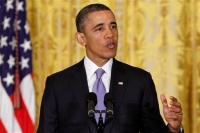By Elle Rothermich

Courtesy of Flickr.
In his final State of the Union address, President Barack Obama attacked polarized partisanship with a vengeance.
The President protested against growing “rancor and suspicion” and the advent of a domestic political environment “where even basic facts are contested.” While Donald Trump and his fantastical breed of macroeconomics seem to thrive on ever-increasing levels of spite, most Americans are lost in the roaring fog.
Obama remained undeterred by this gloom throughout the address, tempering his renewed message of hope and change with a hearty dose of American Exceptionalism. To the eternally frozen wall of Republican countenances (led by Speaker Paul Ryan, who was locked in a staring contest with the back wall of the chamber for the majority of the event) the president offered a vision of a country waxing strong in the face of internal adversity.
Though many of Obama’s cited successes — like the current five percent unemployment rate and the United States’s role in fighting Ebola — stand up to rigorous fact checking, the president does not have a sure legacy.
Many of his foreign policy decisions have been characterized as unqualified failures. Few Americans are willing to fully embrace the nation’s economic growth, and the Affordable Care Act remains a point of contention. The next squadron of presidential hopefuls accept the fog, with each candidate promising to be a sort of messianic cleanup force for the ills and shortcomings of the Obama administration.
However, the ubiquitous suggestion that the Middle East’s current condition is Obama’s creation neglects both the region’s history and globalism itself.
The use of force against ISIL, which Obama called for in his address, is a poor fit for this new type of warfare. But so are his opponent’s alarmist anti-terrorism policies, which draw illogically robust connections between physical threats to U.S. national security and ISIL’s actions in the Levant. Though blaming Obama for the political turmoil in the Middle East is attractive, it is a grand oversimplification that ignores the delicate interplay of countless socioeconomic and political forces.
The continuing use of funds and intelligence from Saudi Arabia, a conservative Sunni kingdom, to arm Syrian rebels is a bold counterpart to the recent deal with Shia Iran. President Obama joked that “gas under two bucks a gallon ain’t bad,” but newly unfrozen Iranian assets could further upset the balance in the oil industry. Even if the U.S. could cut foreign oil consumption 60 percent, as Obama proposed, the country would still feel the impact. China’s attempts to depreciate its currency have sent world financial markets scrambling and many Americans lamenting the state of their 401ks. Although U.S. and European exchanges are again lounging in the sunshine, panic remains in the air. The nation-state may be alive, but isolationist policies are no longer an option.
Healthcare is an equally Byzantine affair. According to new analysis by Matt Broaddus and Edwin Park from the Center on Budget and Policy Priorities, the 2014 health coverage gains under the Affordable Care Act are the largest since 1987. 8.8 million Americans, most part of historically uninsured demographics, were insured. However, according to the study, “if the uninsured rate had fallen in non-expansion states at the same rate as in expansion states, an additional 2.6 million uninsured Americans would have gained coverage.” Despite this data, the Republican party continues its fervent quest to bury the legislation.
Governor Nikki Haley of South Carolina held aloft the standard in the Republican response, calling the health care plan “disastrous”. Her address nevertheless whispered an uncharted truth: on many fronts, Republicans and Democrats agree.
Both the president and Governor Haley lamented the growth of strident factionalism, called for tolerance and pointed to the need for education reforms. Both mentioned indebtedness to America’s forefathers in a grander reference to the United States’ unique virtues.
Both applauded the country’s traditional tenacity in the face of a challenge, but few Americans seemed to hear above the howling winds from the extremes of the political spectrum. The current level of partisanship undermines the ability of the United States to engage fruitfully in an increasingly connected, complex and globalized world.
Our president believes the state of our union is strong. If we are to continue in strength, we must possess the resources to understand the people and institutions we are trying to lead.
Elle Rothermich, FCRH ’19, is a history major from Ridgewood, New Jersey.
